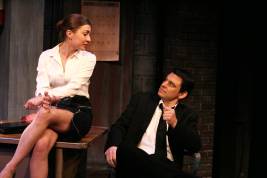
Playwright John Morogiello skewers the backstage world of not-for-profit regional theater in his smart, revealing, and (most importantly) very funny new play Blame It On Beckett, now getting its West Coast Premiere at Burbank’s Colony Theatre.
 Stephen Gifford’s terrifically cluttered set (with clutter provided by MacAndME) takes us to the literary office of the New England theater where dramaturg Jim Foley (Louis Lotorto) has spent ten years collecting—but not necessarily reading—the three thousand or so manuscripts submitted over the past decade by aspiring playwrights hoping for a slot in the theater’s annual season. What these overly optimistic scribes don’t realize is that in Jim’s ten years at the unnamed theater, not a single one of these scripts has ever been staged there, the theater’s once-a-year New Play slot unofficially reserved for the latest opus of a better known playwright than these naïve neophytes, one like playwright-in-residence Tina Fike (Peggy Goss), a power lesbian who sees world premiering her latest in Jim’s theater as nothing more than a stepping stone to Broadway.
Stephen Gifford’s terrifically cluttered set (with clutter provided by MacAndME) takes us to the literary office of the New England theater where dramaturg Jim Foley (Louis Lotorto) has spent ten years collecting—but not necessarily reading—the three thousand or so manuscripts submitted over the past decade by aspiring playwrights hoping for a slot in the theater’s annual season. What these overly optimistic scribes don’t realize is that in Jim’s ten years at the unnamed theater, not a single one of these scripts has ever been staged there, the theater’s once-a-year New Play slot unofficially reserved for the latest opus of a better known playwright than these naïve neophytes, one like playwright-in-residence Tina Fike (Peggy Goss), a power lesbian who sees world premiering her latest in Jim’s theater as nothing more than a stepping stone to Broadway.
Then one day into Jim’s pigsty of an office steps bright and bushy-tailed MFA grad Heidi Bishop (Blythe Auffarth), currently employed in the theater’s box office but hoping for a job more like Jim’s, which she imagines to revolve around the care and nurturing of up-and-coming playwrights.
Heidi soon learns that Jim’s definition of dramaturg (“The guy who reels [new plays and playwrights] in, clubs them, and throws them back because they’re too small”) is night-and-day different from her own. It’s no wonder then that Jim’s way of dealing with a constant string of phone calls is to pick (and hang) up before the caller has even had the chance to say his or her name, or that he’s grown so blasé over the years that he regularly ignores every “Don’t” in the theater’s rule book, including the ones prohibiting smoking or sleeping or eating in his office.
 Though General Manager Mike Braschi (Brian Ibsen) quickly rejects Heidi’s bid for a promotion from box office to back office, he does offer her an unpaid internship as Jim’s unofficial assistant, one that Heidi eagerly accepts, her pricey designer heels suggesting family riches sufficient to allow her to forego whatever salary a paid assistantship might offer. Heidi also agrees to Mike’s request that she keep a journal of suggested improvements to Jim’s office, not suspecting (or at least not appearing to suspect) any ulterior motive Mike might harbor. As for the internship itself, Heidi couldn’t be more pleased, either about the opportunity to put her MFA in dramaturgy to good use or about the proximity it will offer her to Tina, not only her favorite playwright but the subject of her masters’ dissertation.
Though General Manager Mike Braschi (Brian Ibsen) quickly rejects Heidi’s bid for a promotion from box office to back office, he does offer her an unpaid internship as Jim’s unofficial assistant, one that Heidi eagerly accepts, her pricey designer heels suggesting family riches sufficient to allow her to forego whatever salary a paid assistantship might offer. Heidi also agrees to Mike’s request that she keep a journal of suggested improvements to Jim’s office, not suspecting (or at least not appearing to suspect) any ulterior motive Mike might harbor. As for the internship itself, Heidi couldn’t be more pleased, either about the opportunity to put her MFA in dramaturgy to good use or about the proximity it will offer her to Tina, not only her favorite playwright but the subject of her masters’ dissertation.
Anyone who doesn’t see a bit of Eve Harrington in Heidi clearly hasn’t watched the Oscar-winning Best Picture of 1950, though to playwright Morogiello’s credit, both Blame It On Beckett and its four protagonists turn out to be considerably less predictable than we might initially assume.
Avid playgoers are clearly Morogiello’s core audience and those most likely to appreciate the play’s many theatrical references, including its title. (Jim blames most of the hundreds upon hundreds of plot-free play submissions he receives annually on the titular playwright, whose Waiting For Godot “wreaked more havoc on Western drama than Oliver Cromwell” and created a playwriting world in which “plot was pronounced dead, killed by a playwright nobody likes.”
Audience members with regional theater subscriptions will relish Jim’s description of a typical season and its inevitable “A Christmas Carol” in December and African-American play during Black History Month. When Jim describes a rejected submission (is there any other kind?) as “the sort of play small, urban theaters drool over—contemporary, small cast, no set, maybe the occasional gay character,” the laughter this line inspires must surely emit from those who’ve seen any number of similar plays. As for the unsuspecting playwrights whose scripts Jim regularly throws into the trash heap, Blame It On Beckett has the dramaturg tossing one of Morogiello’s onto said pile.
Fortunately for Morogiello, Colony Theatre artistic director Barbara Beckley saved Blame It On Beckett from this ignominious fate, the play’s West Coast Premiere at the 270-seat Colony making for a considerably larger-scale production than its World Premiere last year in a 56-seat New York house.
It’s fortunate too that directorial reins of Blame It On Beckett have been granted to Andrew Barnicle, fresh from the success of the just-reviewed-here The Irish Curse and a director who knows how to bring out the best in a cast, in this case one made up of a Colony favorite and three topnotch Colony newcomers.
Blame It On Beckett makes it an even half-dozen Colony appearances for unofficial resident chameleon Lotorto, once again disappearing into a character, this time the bearded, rumpled, burned-out, cynical, yet still somehow quite sympathetic skin of the delicious dramaturg Morogiello has written for him.
 Auffarth’s Colony debut is an auspicious one, the lovely and talented Antaeus Company member giving us a Heidi whose purity of motives we are torn between believing and doubting (just as Morogiello certainly intends us to).
Auffarth’s Colony debut is an auspicious one, the lovely and talented Antaeus Company member giving us a Heidi whose purity of motives we are torn between believing and doubting (just as Morogiello certainly intends us to).
Goss is marvelous too as Tina, one tough cookie of a playwright whose theme song could easily be, “Whatever Lola Wants, Lola Gets,” with her own name substituted into the title.
Ibsen completes the cast terrifically as Mike, a man who knows exactly how to put his catalog-model handsomeness to good use even as he proves the truth of the proverbial “Beauty’s only skin deep.”
At the risk of sounding like a broken record, Gifford’s scenic design is one of his best ever, an office for which the term “lived-in look” is an understatement, with MacAndME providing nearly as many scripts as their properties design and set dressing for Year Zero did tchotchkes. Kate Bergh’s splendid costumes tell us at first glance exactly who these characters are. Lighting designers Paulie Jenkins and Ilya Mindlin do expert work too, as does sound designer Drew Dalzell, with plenty of phone rings and hilariously scripted between-scene prerecorded interviews, one of which has Beckett trying to sell his script for Waiting For Godot to an uninterested 21st Century theatrical producer.
Ricky Moreno is production stage manager.
At just about two hours including intermission, Blame It On Beckett makes sure not to overstay its welcome, and by the time it reaches its quite satisfying climactic moments, you will likely have come to the same conclusion as this reviewer. An office like Jim’s might not be a place you’d ever want to work, but it’s one heck of a fun place to visit.
Colony Theatre, 555 North Third Street, Burbank.
www.colonytheatre.org
–Steven Stanley
August 11, 2012
Photos: Michael Lamont


 Since 2007, Steven Stanley's StageSceneLA.com has spotlighted the best in Southern California theater via reviews, interviews, and its annual StageSceneLA Scenies.
Since 2007, Steven Stanley's StageSceneLA.com has spotlighted the best in Southern California theater via reviews, interviews, and its annual StageSceneLA Scenies.







 COPYRIGHT 2024 STEVEN STANLEY :: DESIGN BY
COPYRIGHT 2024 STEVEN STANLEY :: DESIGN BY